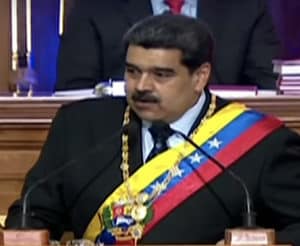Nicolas Maduro, President of Venezuela,
has announced a ten-fold increase to the value of the country’s new national cryptocurrency, el petro, to 36 ooo sovereign bolivars (not to be confused with standard bolivars) and has also raised the minimum wage in the country by 18 000 sovereign bolivars.
According to Forbes, when the sovereign bolivar was first issued in August 2018, 60 sovereign bolivars were equal in value to six million standard bolivars, and price of 1 el petro was pegged at 3600 sovereign bolivars.
The same article shows a photo one roll of toilet paper sitting next to a stac

k of the 2.6 million standard bolivars ($0.40 USD) required last August to purchase it.
The increases are likely being implemented in response to dramatic inflation in Venezuela, which,
according to Business Insider, topped 830 000% in October of this year, and which
Reuter’s claims is veering towards 2 000 000% now.
Venezuela hopes el petro, a digital currency intended for circulation on the Internet, could help the country extricate itself from the grip of US sanctions, sanctions it says are making it impossible for Venezuela’s import-export economy to function.
According to Russian media outlet RIA, Maduro told local media in early December that bilateral trade using el petro is on the agenda at forthcoming discussions scheduled to take place between Venezuela and its ally Russia in March.
Russian Deputy Finance Minister Sergei Storchak, however, downplayed that claim in mid-December when he told reporters that, though certain officials are “familiar” with el petro, Russia has no plans to use it in mutual trade at this time:
“Representatives of our tax service, the Central Bank, remained and got acquainted with the cryptocurrency, which they are now introducing. But no more than that.”
In March of last year,
Time Magazine reported that el Petro is, “…a collaboration—a half-hidden joint venture between Venezuelan and Russian officials and businessmen, whose aim was to erode the power of U.S. sanctions.”
Other critics have called the el Petro project yet another instance of the Venezuelan government “printing money.”
Just before Christmas, Venezuela forced its pensioners to receive their annual bonuses in el Petro and reportedly deposited the crypto into digital wallets it established for them.
But according to Bitcoin.com, “There is still no sign of a crypto wallet for the Petro, the links to download it don’t work, and the Venezuelan government still strives to sell the digital currency and issue certificates of purchase to buyers.”
Some Venezuelans attempting to escaped inflation have become avid users and advocates of Bitcoin, which, despite its volatility, has performed better than the Venezuelan currency of late.
Yesterday, a Venezuelan on Twitter compared the Venezuelan stock market with trading on LocalBitcoins, a peer-to-peer Bitcoin trading service:
Another Venezuelan challenged Maduro’s claims that foreign interference is the main driver behind the declines in Venezuela’s economy:


